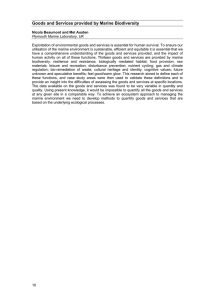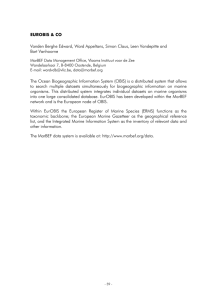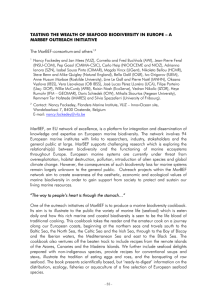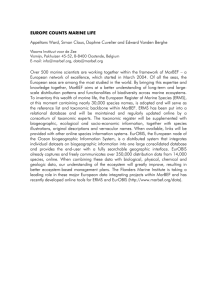Document 12340912
advertisement
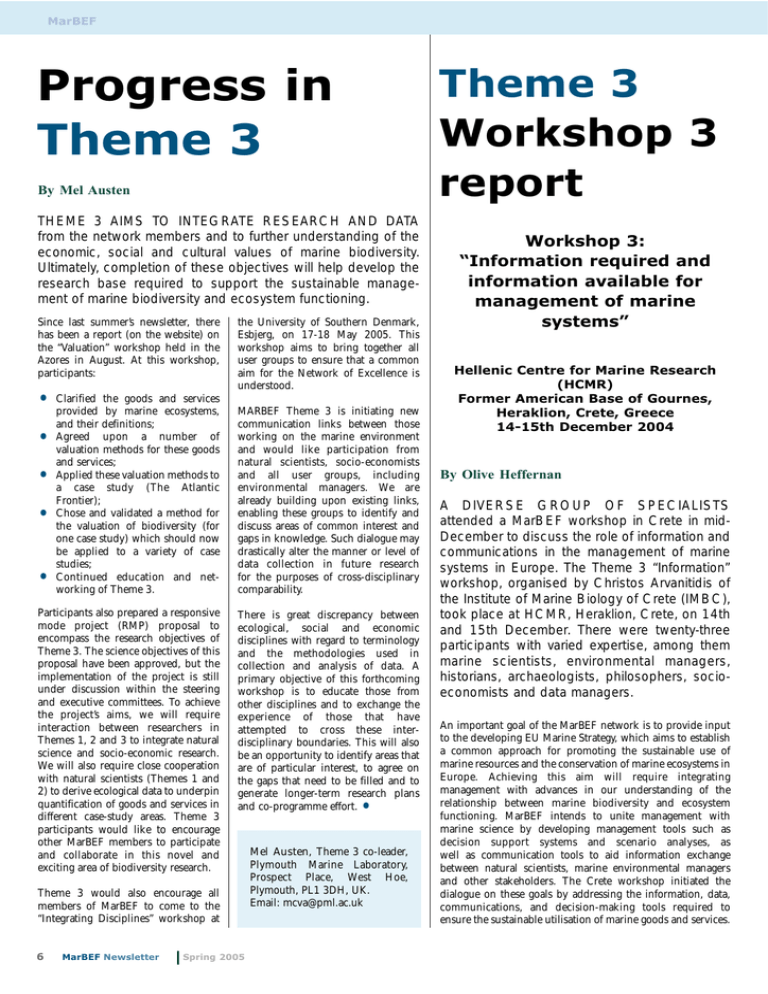
MarBEF Theme 3 Workshop 3 report Progress in Theme 3 By Mel Austen THEME 3 AIMS TO INTEGRATE RESEARCH AND DATA from the network members and to further understanding of the economic, social and cultural values of marine biodiversity. Ultimately, completion of these objectives will help develop the research base required to support the sustainable management of marine biodiversity and ecosystem functioning. Since last summer’s newsletter, there has been a report (on the website) on the “Valuation” workshop held in the Azores in August. At this workshop, participants: the goods and services • Clarified provided by marine ecosystems, • • • • and their definitions; Agreed upon a number of valuation methods for these goods and services; Applied these valuation methods to a case study (The Atlantic Frontier); Chose and validated a method for the valuation of biodiversity (for one case study) which should now be applied to a variety of case studies; Continued education and networking of Theme 3. Participants also prepared a responsive mode project (RMP) proposal to encompass the research objectives of Theme 3. The science objectives of this proposal have been approved, but the implementation of the project is still under discussion within the steering and executive committees. To achieve the project’s aims, we will require interaction between researchers in Themes 1, 2 and 3 to integrate natural science and socio-economic research. We will also require close cooperation with natural scientists (Themes 1 and 2) to derive ecological data to underpin quantification of goods and services in different case-study areas. Theme 3 participants would like to encourage other MarBEF members to participate and collaborate in this novel and exciting area of biodiversity research. the University of Southern Denmark, Esbjerg, on 17-18 May 2005. This workshop aims to bring together all user groups to ensure that a common aim for the Network of Excellence is understood. MARBEF Theme 3 is initiating new communication links between those working on the marine environment and would like participation from natural scientists, socio-economists and all user groups, including environmental managers. We are already building upon existing links, enabling these groups to identify and discuss areas of common interest and gaps in knowledge. Such dialogue may drastically alter the manner or level of data collection in future research for the purposes of cross-disciplinary comparability. There is great discrepancy between ecological, social and economic disciplines with regard to terminology and the methodologies used in collection and analysis of data. A primary objective of this forthcoming workshop is to educate those from other disciplines and to exchange the experience of those that have attempted to cross these interdisciplinary boundaries. This will also be an opportunity to identify areas that are of particular interest, to agree on the gaps that need to be filled and to generate longer-term research plans and co-programme effort. Theme 3 would also encourage all members of MarBEF to come to the “Integrating Disciplines” workshop at 6 MarBEF Newsletter Spring 2005 • Mel Austen, Theme 3 co-leader, Plymouth Marine Laboratory, Prospect Place, West Hoe, Plymouth, PL1 3DH, UK. Email: mcva@pml.ac.uk Workshop 3: “Information required and information available for management of marine systems” Hellenic Centre for Marine Research (HCMR) Former American Base of Gournes, Heraklion, Crete, Greece 14-15th December 2004 By Olive Heffernan A DIVERSE GROUP OF SPECIALISTS attended a MarBEF workshop in Crete in midDecember to discuss the role of information and communications in the management of marine systems in Europe. The Theme 3 “Information” workshop, organised by Christos Arvanitidis of the Institute of Marine Biology of Crete (IMBC), took place at HCMR, Heraklion, Crete, on 14th and 15th December. There were twenty-three participants with varied expertise, among them marine scientists, environmental managers, historians, archaeologists, philosophers, socioeconomists and data managers. An important goal of the MarBEF network is to provide input to the developing EU Marine Strategy, which aims to establish a common approach for promoting the sustainable use of marine resources and the conservation of marine ecosystems in Europe. Achieving this aim will require integrating management with advances in our understanding of the relationship between marine biodiversity and ecosystem functioning. MarBEF intends to unite management with marine science by developing management tools such as decision support systems and scenario analyses, as well as communication tools to aid information exchange between natural scientists, marine environmental managers and other stakeholders. The Crete workshop initiated the dialogue on these goals by addressing the information, data, communications, and decision-making tools required to ensure the sustainable utilisation of marine goods and services.
